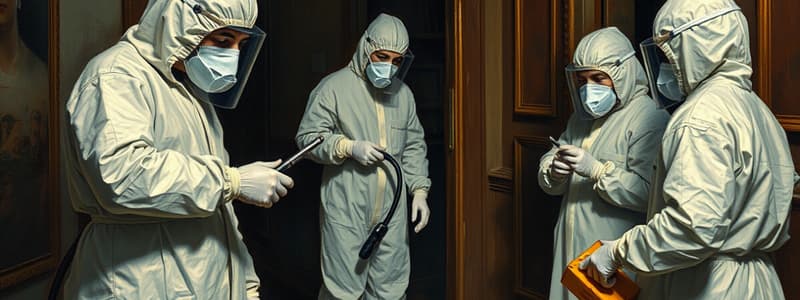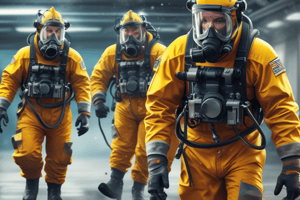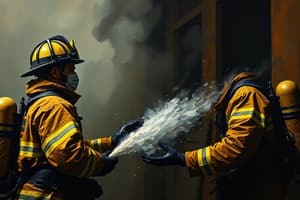Podcast
Questions and Answers
What should personnel ideally do before consuming food or drinks during an incident response?
What should personnel ideally do before consuming food or drinks during an incident response?
- Conduct a safety briefing
- Invest in high-quality personal protective equipment
- Finish initial decontamination (correct)
- Notify the Incident Commander
What is a recommended practice to reduce the risk of contamination following decontamination procedures?
What is a recommended practice to reduce the risk of contamination following decontamination procedures?
- Proceed immediately to the incident command post
- Re-enter the Hot Zone without restrictions
- Engage in a leisure activity to relax
- Cool down before entering any contaminated areas (correct)
What is the most critical action when personnel are reassigned to the Hot Zone after completing a decontamination process?
What is the most critical action when personnel are reassigned to the Hot Zone after completing a decontamination process?
- Immediately reload hose lines without checks
- Notify other personnel about the change
- Go through the decontamination process again upon exiting (correct)
- Skip the decon process for efficiency
What specific step should personnel take when reloading hose lines to mitigate contamination risks?
What specific step should personnel take when reloading hose lines to mitigate contamination risks?
What is recommended for personal protective equipment (PPE) once personnel are released by the Incident Commander?
What is recommended for personal protective equipment (PPE) once personnel are released by the Incident Commander?
What is the primary responsibility of the Incident Commander regarding decontamination?
What is the primary responsibility of the Incident Commander regarding decontamination?
Which of the following is a guideline for setting up the decon hose line?
Which of the following is a guideline for setting up the decon hose line?
What is the correct order for rinsing off contaminants from personnel exiting the Hot Zone?
What is the correct order for rinsing off contaminants from personnel exiting the Hot Zone?
When is it appropriate for personnel to go off-air during decontamination?
When is it appropriate for personnel to go off-air during decontamination?
What must personnel consider when decontaminating equipment like SCBA and tools?
What must personnel consider when decontaminating equipment like SCBA and tools?
What should a Drop Zone be established in relation to personnel?
What should a Drop Zone be established in relation to personnel?
Which order of operations should personnel follow for the decontamination of skin?
Which order of operations should personnel follow for the decontamination of skin?
What type of gloves and protection should personnel wear when cleaning equipment?
What type of gloves and protection should personnel wear when cleaning equipment?
Flashcards are hidden until you start studying
Study Notes
Decontamination Guidelines for Fire Department Personnel
- Decontamination is essential for personnel exposed to combustion products or contaminants to prevent further exposure.
- Gross decontamination must occur before entering the Cold Zone or leaving the incident scene.
Incident Commander Responsibilities
- Each incident requires a designated decon location announced by the Incident Commander.
- Generally established by the first arriving engine company or initial Incident Commander.
Engineer's Role in Decontamination Setup
- The Engineer oversees the decon process, including setting up approved hose lines and supporting equipment outside the Hot Zone.
- Sufficient water flow is necessary to prevent contaminants from embedding into PPE and equipment.
- Additional lines may be set up for decon of multiple personnel.
- A Drop Zone can be established downwind to manage decontamination logistics.
Personnel Procedures upon Exiting Hot Zone
- Personnel must remain on-air and proceed directly to the decon location.
- Those with the lowest air supply are prioritized for decontamination.
- Rinsing should be systematic, targeting high collection points and avoiding saturation of PPE inner linings.
Equipment Decontamination
- Post-rinse, personnel can doff their SCBA using approved techniques.
- Suitable PPE (EMS gloves and eye protection) should be worn during equipment decontamination.
- Use department-issued soaps, soft-bristle scrub brushes, and cleaners to aid the process.
PPE Handling
- Depending on the incident’s extent, all PPE can be placed in a prepared Drop Zone.
- Approved methods should be utilized for cleaning exposed skin areas like the head, neck, and hands.
Eating and Hydration Post-Decontamination
- Personnel should avoid consuming food or drinks until initial decontamination is completed.
Cooling Down After Decontamination
- Cooling down post-decon helps reduce potential for further contamination.
Minimizing Contamination in the Cold Zone
- Complete decon processes prior to entering the Rehab Sector.
- When reassigned to the Hot Zone, re-exit through the decon process as needed (e.g., salvage efforts).
- Clean contaminants off hose lines before reloading and follow decon steps after all equipment handling.
- After being released from the incident, recommend sealing PPE in bags to prevent off-gassing and contamination of the apparatus cab.
Studying That Suits You
Use AI to generate personalized quizzes and flashcards to suit your learning preferences.





